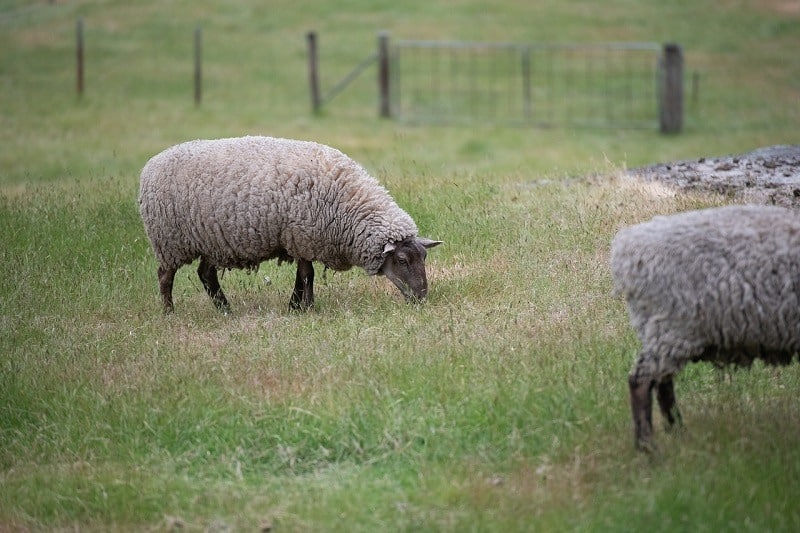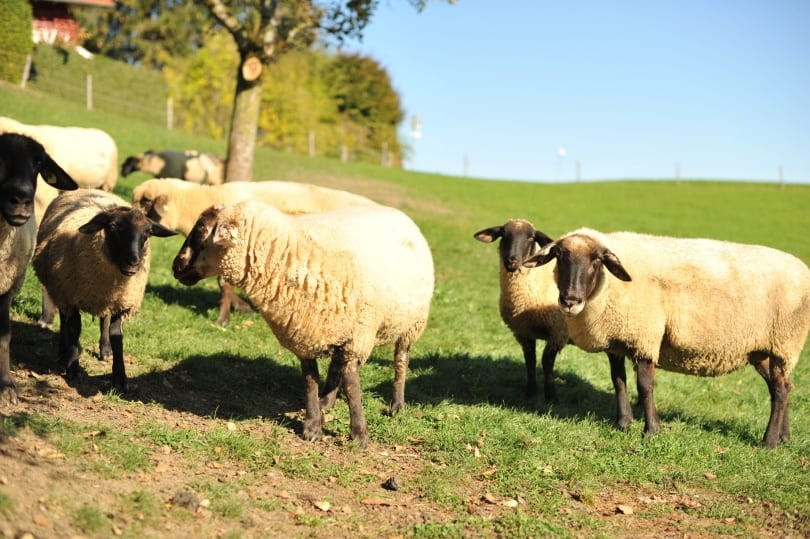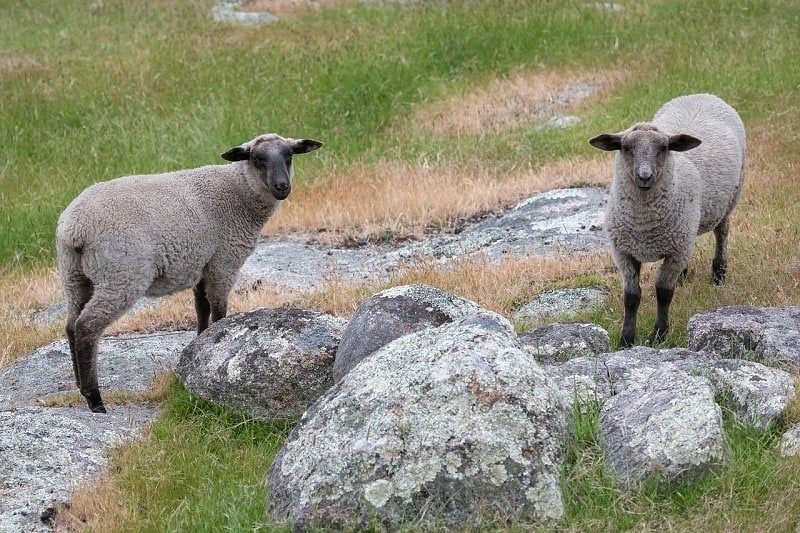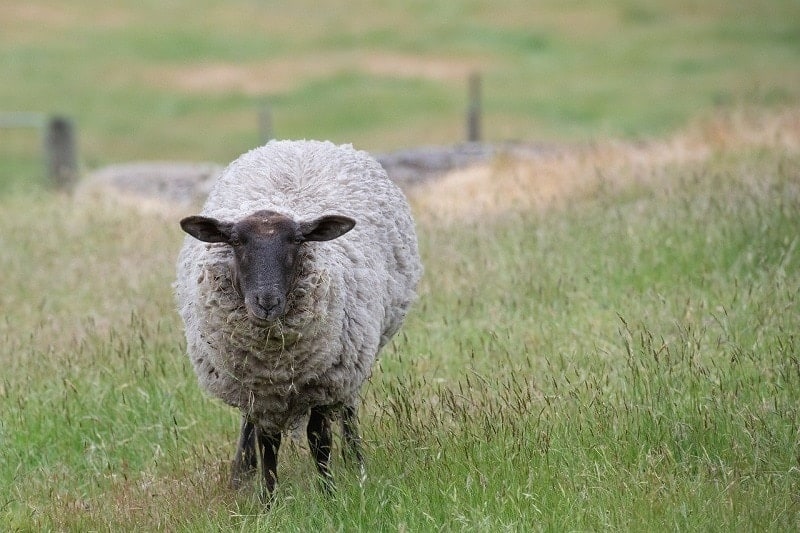Suffolk sheep are a common British domestic sheep that you can find on many farms in England and the United States. Breeders created it in the late 18th century primarily for its meat but it also serves as a good source of wool.
Join us as we look at this interesting animal to learn more about it to see if it’s right for your farm or backyard.

Quick Facts about Suffolk Sheep
| Species Name: | Ovis aries |
| Family: | Bovidae |
| Care Level: | Moderate |
| Temperature: | All climates |
| Temperament: | Alert, intelligent, easy to herd |
| Color Form: | White and black |
| Lifespan: | 6 – 14 years |
| Size: | 29 – 32 inches and 200 – 300 pounds |
| Diet: | Herbivore |
| Minimum Shelter Size: | 6’ x 4’ x 3’ |
| Shelter Set-Up: | Bedding and ventilation |
Suffolk Sheep Overview
The Suffolk sheep started in England in the late 1800s, but breeders have since exported these sheep worldwide, including the United States, where they remain popular as a source of meat and wool. Its unique coloring and large size are part of its heritage. It’s a fantastic grazer and can help maintain the land and prevent the growth of bushes.

How Much Do Suffolk Sheep Cost?
You can expect to spend between $100 and $300 for a young ewe and $300 to $500 for a flock ram. If you want a stud ram to breed more sheep, you can expect to pay $1,000 and up, with some fetching as much as $10,000.
You will also need to purchase vaccinations and food during the winter, among other things that can add to your Suffolk sheep’s overall cost.

Typical Behavior & Temperament
Suffolk sheep are easy to herd, so they don’t cause much trouble in the field. They are smart and quickly learn where their pen is and start to follow a routine. While they can get angry, they quickly settle down and are easy to placate. Their friendly demeanor and unique personalities make them great backyard pets.
Appearance & Varieties
The Suffolk sheep is a large sheep with a distinctive white body and black face, and front legs. It has no horns and a short neck. The body and legs are muscular, and it’s well adapted to all environments.

How to Take Care of Suffolk Sheep

Habitat Conditions & Setup
Your Suffolk sheep is an efficient grazer and will need plenty of grass to eat. These sheep also like to move around, so most experts recommend supplying your sheep with at least a half-acre of land, though you can fit a small group on a single acre. You will need to buy or build a small shelter, roughly 6 W x 4’ D x 3’ H. You’ll need to increase this size as you add more sheep. The shelter only needs to be three sides so your sheep can escape the rain, snow, sun, and other weather extremes.
You will also need to install a fan to make sure there is plenty of ventilation to keep your sheep cool during the summer months. It is recommended to put down some straw bedding to make your sheep more comfortable. You can use other types of bedding, but it might stick to their fur and make it difficult to shear them when the time comes.
Salt Lick
Your sheep will need access to a salt lick to stay healthy. Salt licks are not expensive and easy to find. You can also purchase ground salt to better determine how much is in their diet.
Water
A single sheep can go through several gallons of water each day, especially when the weather is hot. You will need to check their water supply often and refill it as necessary. Many experts recommend an automatic waterer to cut down on the work you need to do.
Do Suffolk Sheep Get Along with Other Pets?
The Suffolk sheep is a calm animal that rarely gets agitated. It should not cause any of your other pets trouble. However, several herding dog breeds, like the Border Collie, will find it extremely difficult not to attempt to herd the sheep. This could lead to problems between the two animals. Plenty of socialization can help, but you will need to supervise any interaction.


What to Feed Your Suffolk Sheep
If you have a large yard with varied plants, you will not need to feed them much — at least during the growing months. Once there is snow on the ground, you will need to supply them with plenty of hay. Hay made from alfalfa and clover is best. Other types of grain might have too much copper for your sheep, which can lead to health problems.
Keeping Your Suffolk Sheep Healthy
Hooves
Keeping your Suffolk sheep healthy is not too much of a challenge. Your sheep will need a dry surface to walk on in order to keep their hooves in good shape and avoid foot rot. If the ground is not sufficient to wear down the hooves, you will need to trim them every 4-6 weeks. If the ground is too moist, it can soften the hooves and allow bacteria to set in. This bacterium will lead to foot rot, which can be painful and result in lameness. You will need to trim away the infected hoof and apply antiseptic. You will also need to separate the afflicted sheep to prevent the spread of the disease.
Shearing
You will need to shear your sheep once a year to prevent the wool from becoming waterlogged and attracting flies. Many owners like to keep the area below the tail trimmed because urine and feces can often cling to the fur that is too long in this area.
Deworm
Your sheep will also need to occasionally see a vet to make sure they have not contracted worms, which can cause health problems for your pet. There are various medications available that your vet will recommend to get rid of whatever parasite your sheep has contracted.
Breeding
Breeding Suffolk sheep is not difficult if you have a breeding ram. However, you can purchase several sheep for a single breeding ram price, so many owners choose to simply buy sheep as the need arises. If you want to breed your sheep, you will also need to research the ram you intend to purchase to make sure it’s free of genetic defects.

Are Suffolk Sheep Suitable for You?
Suffolk sheep make great additions to any farmland, and they are also fantastic pets. They don’t require much maintenance and can survive in most climates. They are not too expensive and will produce a reliable amount of meat and wool.
We hope you have enjoyed reading over this guide and have decided to get one or more of these fantastic grazers for your property. If you know other people looking for a friendly and versatile sheep, please share this guide to the Suffolk sheep on Facebook and Twitter.
- Related read: Border Leicester Sheep
Featured Image Credit: pen_ash, Pixabay
